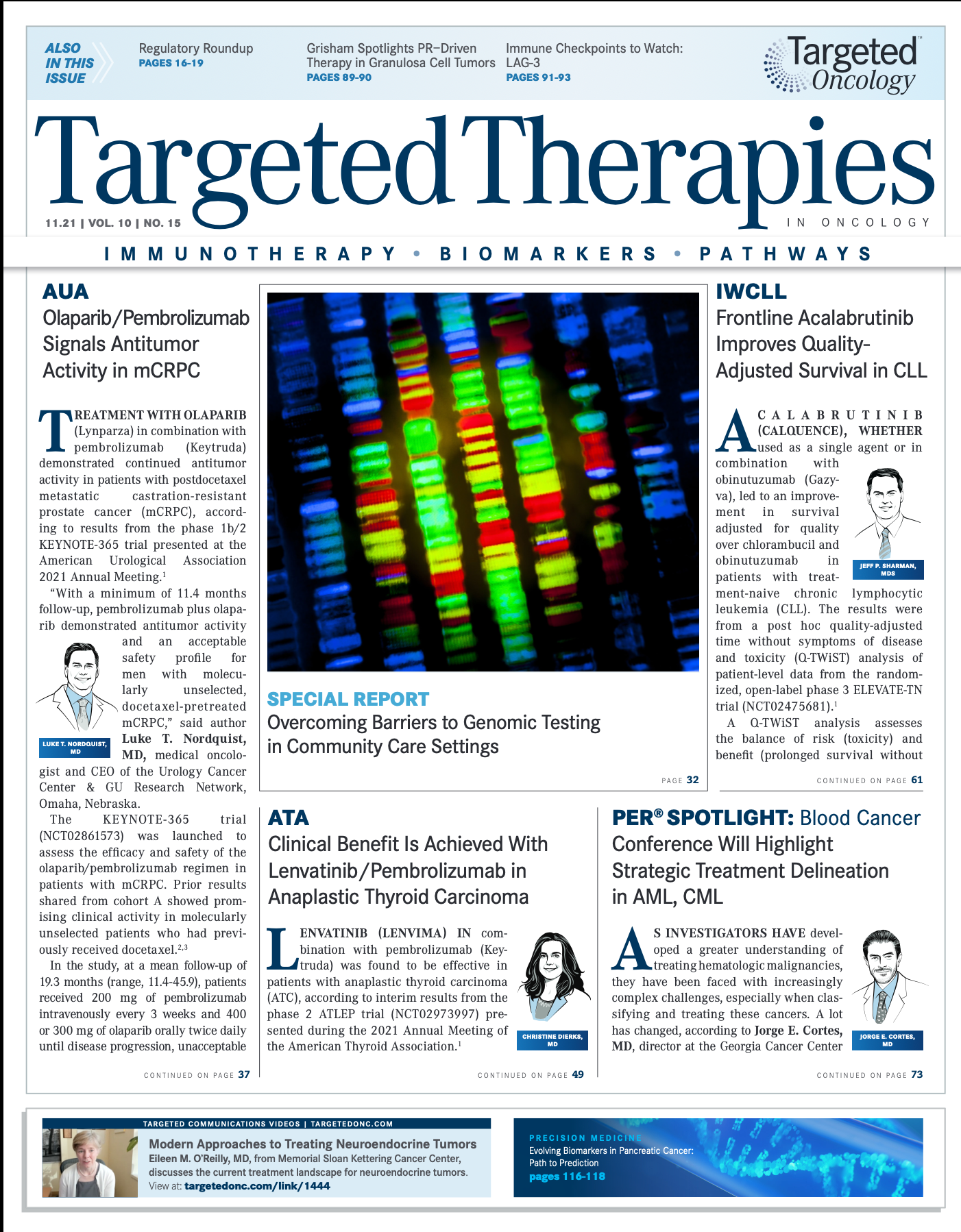Adding Camrelizumab to Chemotherapy Improves Survival in Patients With Advanced or Metastatic ESCC
Results from the phase 3 ESCORT-1st trial have demonstrated promise for the combination of camrelizumab and chemotherapy in patients with advanced or metastatic esophageal squamous cell carcinoma.

The addition of camrelizumab to chemotherapy improved overall survival (OS) and progression-free survival (PFS) in patients with advanced metastatic esophageal squamous cell carcinoma (ESCC) compared with placebo plus chemotherapy. Findings of the randomized, double-blind, placebo-controlled phase 3 ESCORT-1st trial (NCT03691090) were published in JAMA.1
Investigators reported a median OS of 15.3 months (95% CI, 12.8-17.3) for patients in the camrelizumab plus chemotherapy arm compared with a median of 12.0 months (95% CI, 11.0-13.3) for patients in the placebo plus chemotherapy arm (TABLE1). Median PFS was reported as 6.9 months (95% CI, 5.8-7.4; 199 progression or deaths) for patients in the treatment arm, compared with a median PFS of 5.6 months (95% CI, 5.5-5.7; 229 progression or deaths) in the control arm. The risk for progression or death was 44% (HR, 0.56; 95% CI, 0.46-0.68; 1-sided P < .001). Chemotherapy remains the first line treatment for metastatic ESCC, although outcomes have been suboptimal.
The study was conducted between December 3, 2018 and May 12, 2020 with the final follow- up on October 20, 2020. The study registered patients from 60 hospitals in China. Eligible patients ranged from 18 to 75 years of age with a confirmed diagnosis of ESCC with no prior systemic therapy. Of the 751 patients screened, 596 patients were eligible for evaluation.
Of the 596 involved, 523 (87.8%) were men. The median age was 62 years. Patients were excluded if they had other malignancies, a history of autoimmune disease, central nervous system metastases, and were given antitumor vaccines within 4 weeks leading up to study enrollment.
On day 1, patients were given either camrelizumab or the placebo in 200 mg doses followed by paclitaxel (175mg/m2) and cisplatin (75mg/m2) for up to 6 cycles. Treatments continued until disease progression, according to the Response Evaluation Criteria in Solid Tumors guidelines, unacceptable toxic effects, withdrawal of consent, death, or new antitumor treatment occurred.
Tumor response was determined every 6 weeks using radiographic examination. Median overall survival, PFS, and duration of response were determined.
In the study, 3 limitations were noted. First, some patients in the placebo plus chemotherapy group received checkpoint inhibitor treatment after disease progression which can affect estimates for OS. Second, programmed death receptor ligand (PD-L1) expression and immunotherapy plus chemotherapy in ESCC have an unclear correlation at this time. Third, efficacy-related biomarker tests, aside from PD-L1 expression, have yet to be analyzed.
Secondary outcomes showed the camrelizumab plus chemotherapy group OS probability at 6 months was 89.2% (95% CI, 85.1%- 92.2%); at 12 months, 61.5% (95% CI, 55.4%-67.1%); and at 18 months, 42.7% (95% CI, 35.3%-50.0%). The placebo plus chemotherapy group had an OS probability at 6 months was 85.5% (95% CI, 80.9%-89.0%); at 12 months, 49.8% (95% CI, 43.6%-55.6%); and at 18 months, 29.5% (95% CI, 22.9%- 36.3%).
OS and PFS did not significantly vary among most prespecified subgroups. However, post hoc analyses showed significant interaction performance based on liver metastases and alcohol status. In patients with a baseline PD-L1 expression less than 1% and those with 1% or higher, the hazard ratios for death in the camrelizumab plus chemotherapy group were 0.79 (95% CI, 0.57-1.11) and 0.59 (95% CI, 0.430.80) with a P value for interaction of 0.32.
Subgroup analysis pointed towards consistent benefits among the camrelizumab plus chemotherapy group in both OS and PFS over placebo plus chemotherapy. No new adverse events were identified.
Most patients experienced treatment- related adverse events (TRAEs) with 296 patients (99.3%) in the camrelizumab plus chemotherapy group and 288 (97.0%) from the placebo plus chemotherapy group. Of these adverse events, 189 patients (63.4%) from the camrelizumab plus chemotherapy group and 201 patients (67.7%) from the placebo plus chemotherapy group reported a grade 3 or higher. The most common adverse events included decreased neutrophil count (119 [39.9%] vs 129 [43.4%]), decreased white blood cell count (72 [24.2%] vs 79 [26.6%]), and anemia (52 [17.4%] vs 40 [13.5%]). The results show that although both forms of treatment showed high displays of adverse events, the camrelizumab plus chemotherapy group showed slightly less severe events.
In the camrelizumab plus chemotherapy group, investigators reported 90 patients (30.2%) experienced serious TRAEs and 69 patients (23.2%) in placebo plus chemotherapy group experienced serious TRAEs with pneumonitis being the most common of these serious TRAEs. Though of the pneumonitis events expressed, most of these cases were found in the camrelizumab plus chemotherapy group (17 [5.7%] vs 8 [2.7%]).
Some TRAE’s resulted in treatment interruption for 135 patients (45.3%) in the camrelizumab plus chemotherapy group and 71 patients (23.9%) in the placebo plus chemotherapy group. Further, 36 patients (12.1%) in camrelizumab plus chemotherapy and 28 patients (9.4%) in placebo-chemotherapy opted out of at least 1 treatment component because of TRAEs. TRAEs caused 9 (3.0%) patient deaths in camrelizumab plus chemotherapy and 11 (3.7%) patient deaths in placebo-chemotherapy.
Disease progression (141 [47.3%] vs 189 [63.4%]) was the primary cause of discontinuation of treatment in each group. Among the groups, 119 patients (39.9%) from the camrelizumab plus chemotherapy group and 158 patients (53.0%) from the placebo plus chemotherapy group received additional treatment after discontinuation of the study treatment. The study continues and long-term assessments will be reported.
REFERENCES:
1. Luo H, Lu J, Bai Y, et al. Effect of camrelizumab vs placebo added to chemotherapy on survival and progression-free survival in patients with advanced or metastatic esophageal squamous cell carcinoma: The ESCORT-1st randomized clinical trial. JAMA. 2021;326(10):916925. doi:10.1001/jama.2021.12836
